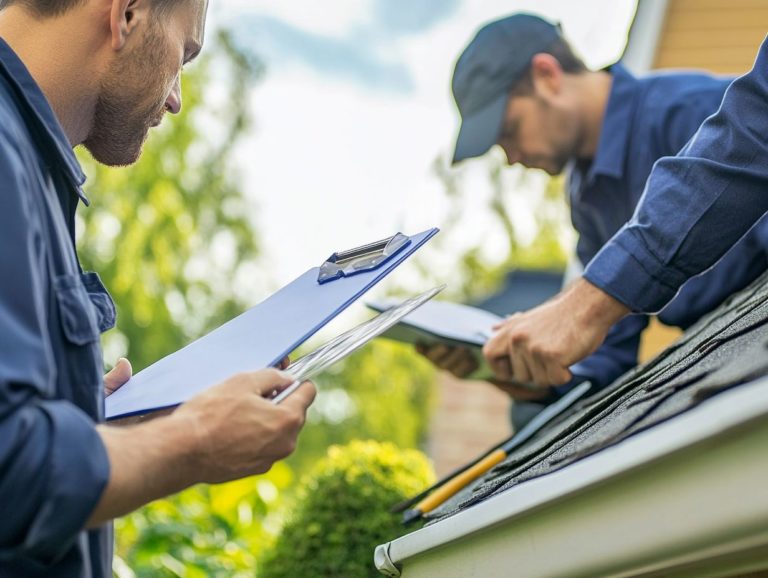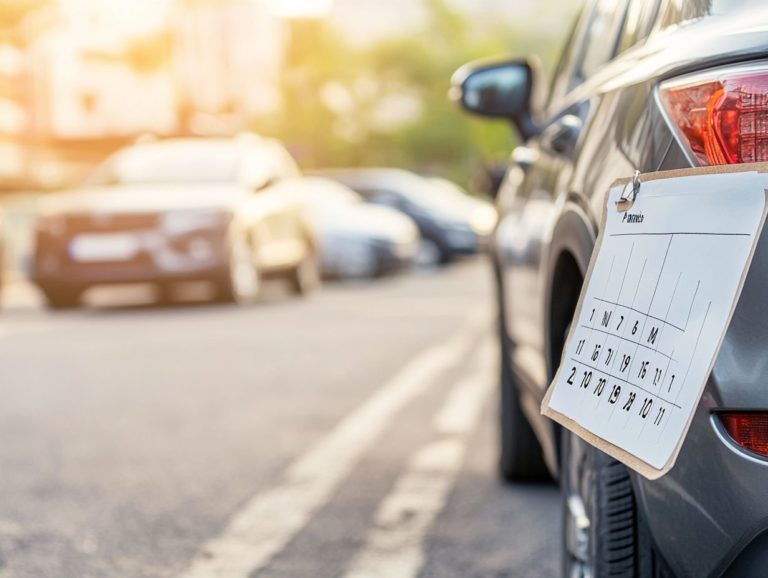5 Essential Safety Checks for Used Cars
Buying a used car can be an exhilarating journey, yet it often carries a fair share of uncertainties.
To navigate this process effectively, there are five essential safety checks you should undertake. By examining the vehicle’s history and verifying ownership documents, you equip yourself to make an informed decision.
It’s important to weigh the benefits and risks of buying a used vehicle. Be mindful of common issues that may arise and arm yourself with tips for safeguarding your investment.
Dive in now! Make your next car purchase not just a choice, but a savvy investment for your future!
Contents
- Key Takeaways:
- 1. Check the Vehicle’s History Report
- 2. Inspect the Exterior and Interior of the Car
- 3. Test Drive the Car
- 4. Have a Mechanic Conduct a Thorough Inspection
- 5. Verify the Title and Ownership Documents
- What Are the Benefits of Buying a Used Car?
- Frequently Asked Questions
- What are the 5 essential safety checks for used cars?
- Why are these safety checks important?
- How do I check the tires?
- What should I look for when inspecting the brakes?
- What fluids should I check?
- Do I need a professional to perform these safety checks?
Key Takeaways:
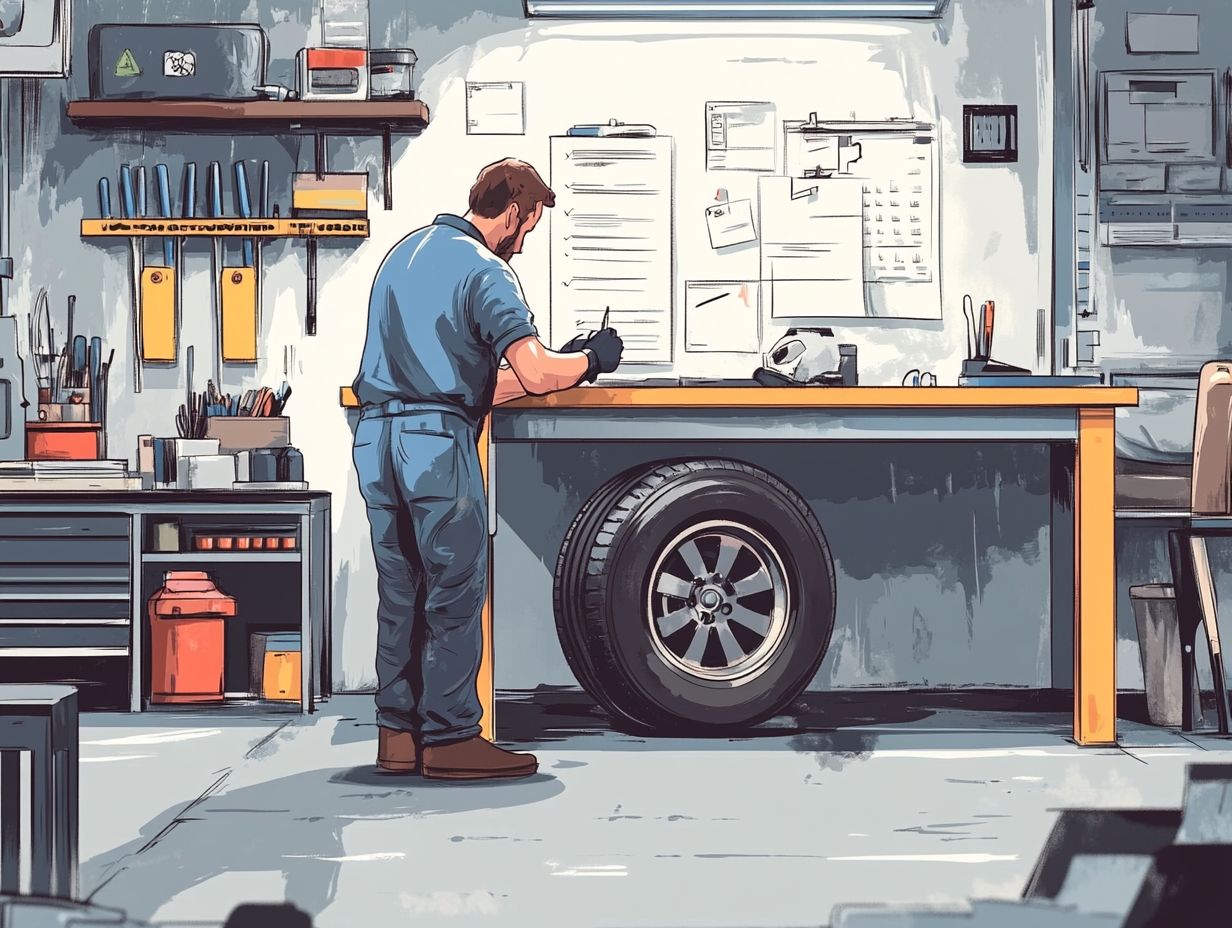
- Always check the vehicle’s history report to ensure it has not been in any major accidents or has a history of mechanical issues.
- Perform a thorough inspection of both the exterior and interior of the car to identify any potential safety hazards.
- Take the car for a test drive to ensure it is in good working condition and to detect any unusual noises or issues.
1. Check the Vehicle’s History Report
Before you make a purchase, it’s essential to dive into the vehicle’s history report. This report reveals key details about the car’s past, including any previous accidents, maintenance records, and overall reliability, all of which directly impact its market value and safety for you as a potential buyer.
Obtaining this report from a reputable source like Carfax can unveil hidden issues that might not be obvious during your initial inspection. For example, past incidents could include severe collisions that threaten the car’s ability to stay safe and strong or unresolved mechanical problems that might lead to costly repairs in the future.
Detailed maintenance logs offer a glimpse into how well the car has been cared for, enabling you to make informed decisions that align with your budget and preferences. Ultimately, understanding these factors can significantly enhance your peace of mind, ensuring a more successful and satisfactory vehicle purchase.
2. Inspect the Exterior and Interior of the Car
Thoroughly inspecting both the exterior and interior of a used car is essential for identifying any bodywork issues, signs of corrosion, or mechanical problems that could affect its performance and longevity. For tips on this process, check out how to inspect your car before driving.
When assessing the exterior, look closely at the paint condition as well as any noticeable dents or rust spots that might indicate underlying damage. A meticulous evaluation of the bodywork reveals how well the car has been maintained over time.
As you move to the interior, checking for wear and tear in the upholstery such as stains or tears is vital, as these can affect both aesthetics and comfort. It s also important to test the infotainment system to ensure all features are functioning seamlessly.
Don t overlook the key mechanical components, either. Inspecting the engine, transmission, and brakes is crucial for catching any potential issues before they escalate into costly repairs down the line.
3. Test Drive the Car
A comprehensive test drive is one of the most effective ways for you to evaluate a used car. It allows you to assess its performance on several key criteria, including the smoothness of the steering system, the responsiveness of the transmission, and any potential alignment issues.
During this crucial evaluation, focus on how well the vehicle accelerates from a stop and how it handles when merging onto highways. Pay close attention to the braking performance; abrupt or unusually soft braking can hint at underlying issues.
You should also assess the vehicle’s handling, particularly in turns, as its stability can reveal much about its overall condition. Monitor how it performs under various conditions, like on wet or uneven roads. Be alert for any unusual noises or vibrations while driving, as these can signal mechanical problems.
Ultimately, a thorough examination will provide you with invaluable insights into the car’s reliability and overall state, enabling you to make a well-informed decision.
4. Have a Mechanic Conduct a Thorough Inspection
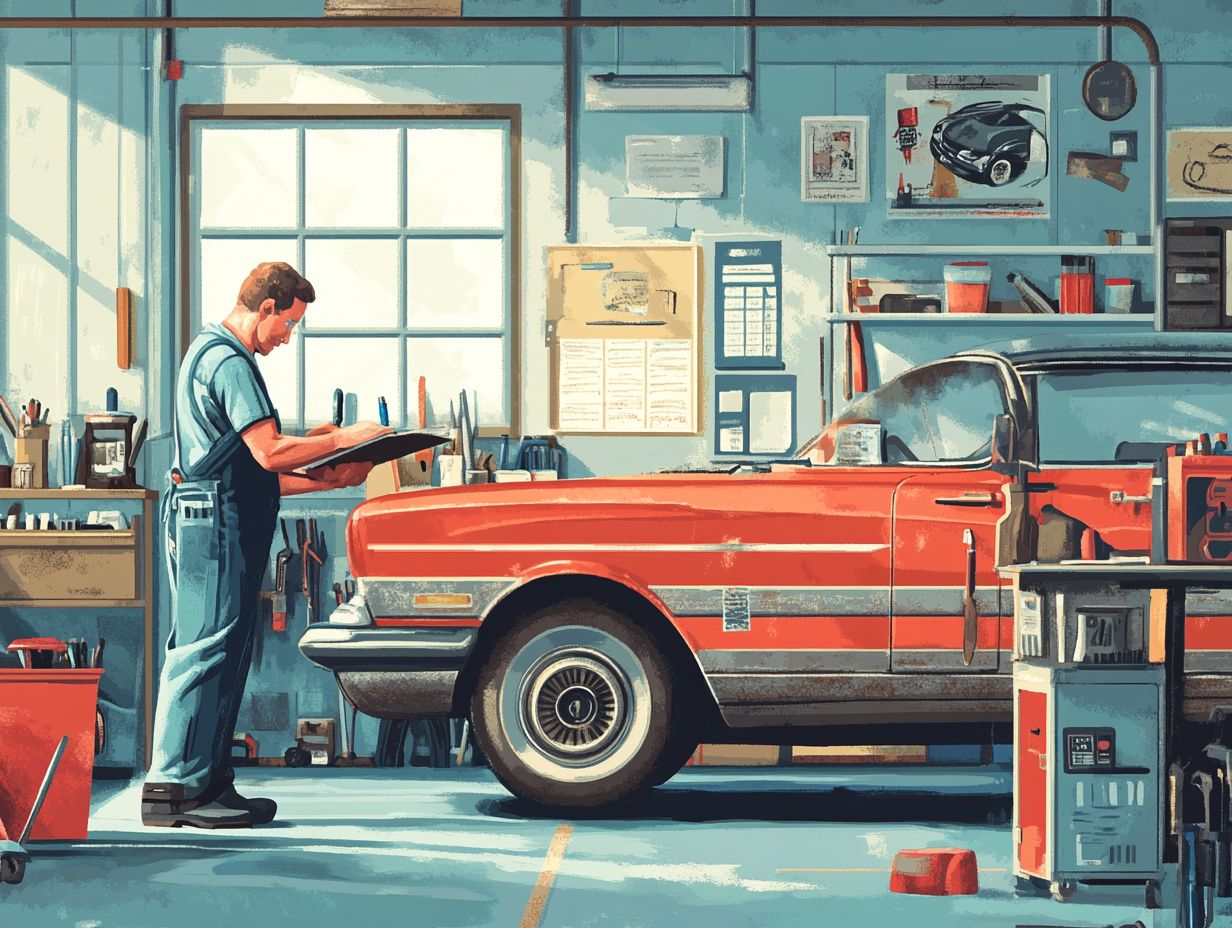
Engaging a qualified mechanic for a comprehensive vehicle inspection can reveal hidden mechanical failures and yield a detailed condition report. For new car buyers, following an essential checklist is invaluable in determining a fair repair estimate and ensuring the safety and reliability of the used car.
An ASE-certified mechanic brings a wealth of knowledge and experience to the assessment. They evaluate critical components such as the engine, brakes, and electrical systems with remarkable precision.
Their trained eye can detect issues that might escape an untrained observer, such as subtle leaks or worn brake pads, which could lead to costly repairs later on. By leveraging this expertise, you can make well-informed decisions, steering clear of vehicles that may appear fine at first glance but conceal significant concerns.
This approach not only saves you money but also enhances your peace of mind throughout the purchasing process. Act now to ensure your car is ready for the road!
5. Verify the Title and Ownership Documents
You must verify the vehicle registration and ownership documents to confirm the legal owner of that used car. This step ensures there are no discrepancies, particularly when dealing with used car dealers or private sellers.
This process involves a few essential steps, starting with checking local and state databases for any existing liens. A lien is a legal claim against a vehicle that can affect ownership.
Reviewing insurance and registration records is crucial, as it ensures compliance with local laws and protects you against future liability. Accurate records reflect rightful ownership and safeguard you from unforeseen issues, such as unresolved claims or improper registrations.
This process provides you with peace of mind throughout the transaction. Take the time to verify all documents!
What Are the Benefits of Buying a Used Car?
Purchasing a used car presents a wealth of advantages that often position it as a more practical and financially astute choice compared to new vehicles.
- Benefit from lower asking prices.
- Enjoy reduced depreciation.
- Access quality vehicles that have been cared for by previous owners who valued preventative maintenance (routine care to keep the vehicle in good condition).
You can also enjoy the perks of lower insurance premiums due to the decreased replacement value of used cars, leading to substantial savings over time. You might also find tax benefits, as many states offer lower registration fees for older vehicles.
If you re considering a long-term investment, many used cars come with established maintenance records, giving you confidence in their reliability.
By diligently researching used car values, you enable yourself to make informed purchasing decisions, ensuring that you secure the best deal while maximizing your financial advantages.
What Are the Risks of Buying a Used Car?
Buying a used car can certainly be advantageous, but it comes with its own set of risks.
- You might encounter undisclosed mechanical issues.
- Hidden problems that could impact vehicle emissions.
- The essential need for thorough safety checks to confirm the car’s reliability.
Many buyers tend to overlook the significance of obtaining a comprehensive vehicle history report. This report can unveil critical information about prior accidents, repairs, and maintenance that the seller may not willingly disclose.
It’s imperative for you to conduct a meticulous inspection, potentially enlisting the help of a trusted mechanic, to evaluate a used car’s condition before finalizing your purchase. By ensuring the car meets safety standards and understanding its past, you can steer clear of unexpected expenses in the future.
This approach not only enhances your peace of mind but also allows for a more informed and confident buying experience. Don’t skip this vital step!
What Are the Most Common Issues with Used Cars?
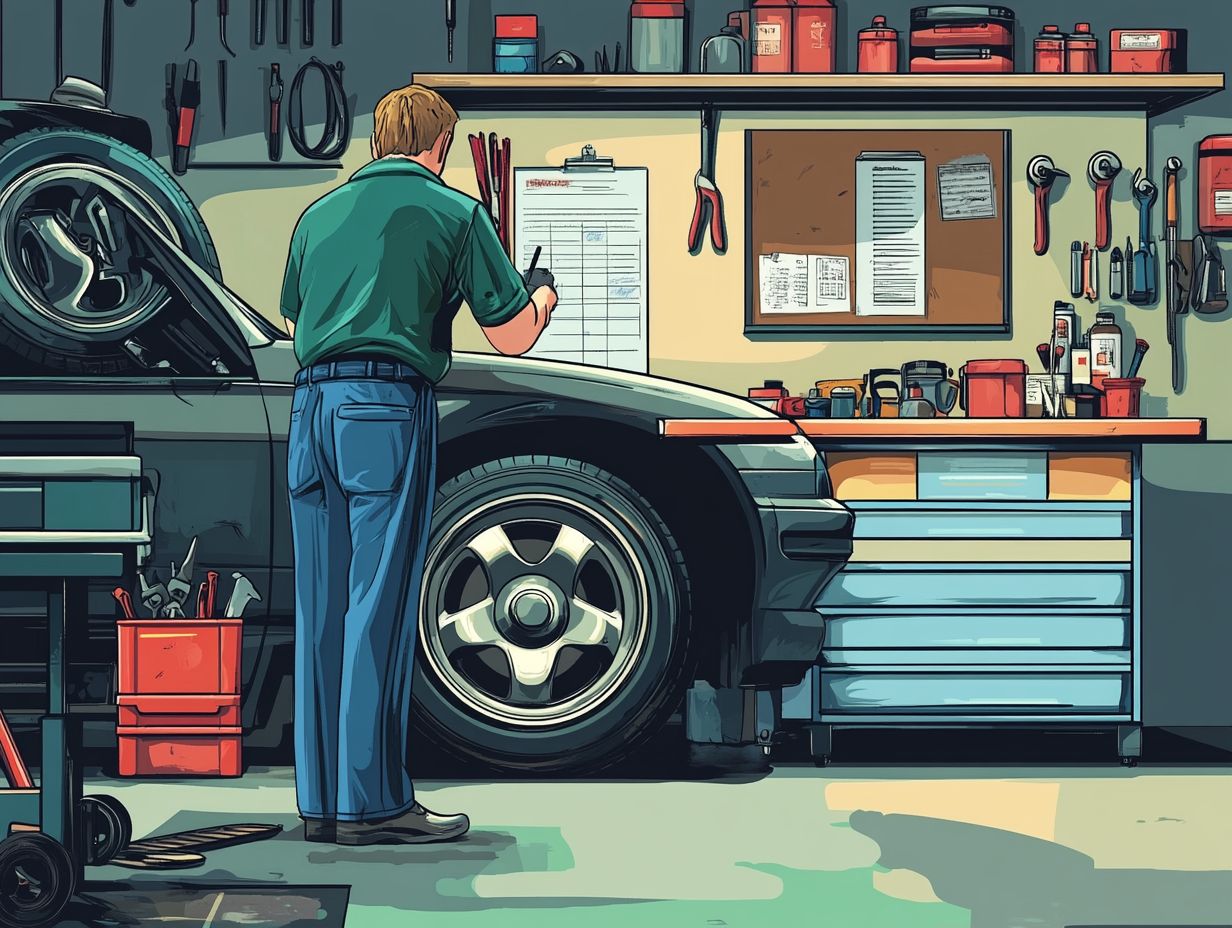
When you’re in the market for a used car, understanding common issues can save you from unexpected costs.
Car problems, such as battery issues, brake fluid leaks, and clutch problems, are particularly troublesome.
Battery issues refer to when the car doesn t start due to a dead battery. Brake fluid is necessary for the brakes to work properly.
Being aware of these concerns helps in your search for a reliable vehicle. Worn brakes can compromise your safety and lead to costly replacements. Clutch problems can detract from overall performance, making it essential to check a vehicle’s service history.
By recognizing these potential pitfalls and conducting thorough inspections or seeking expert evaluations, you can make informed decisions. This may allow you to negotiate better prices or avoid vehicles likely to incur expensive repairs later on.
How Can a Buyer Protect Themselves When Purchasing a Used Car?
To secure a successful purchase, adopt protective measures that elevate your buying experience. Conduct thorough vehicle inspections, review service records, and identify key negotiation points.
One effective strategy is to request a detailed condition report from the seller. This document can provide insights into the vehicle s maintenance history and any past issues.
Transparency in service records is essential; these validate the seller s claims and reveal how well the vehicle has been cared for over time.
When it s time to negotiate, being well-informed about the vehicle s history and its current market value enables you to make reasonable offers. This approach can save you significant amounts of money while ensuring you acquire a reliable vehicle.
What Are the Legal Requirements for Buying a Used Car?
Understanding the legal requirements for buying a used car is crucial for ensuring a smooth transaction. It involves verifying the legal owner, obtaining insurance, and completing vehicle registration according to guidelines set forth by entities like the Federal Trade Commission.
As a prospective buyer, be aware of the necessary documentation, such as the bill of sale and title transfer forms. These validate your transaction and establish your ownership rights.
Following the registration process meticulously is essential, which may include paying sales tax and ensuring the vehicle meets emission standards.
Purchasing adequate insurance coverage protects you financially and ensures compliance with local laws. This minimizes the risk of fines or legal disputes in the future. Adhering to these regulations allows you to navigate the process confidently, avoiding potential pitfalls from insufficient paperwork or oversight.
What Are Some Red Flags to Look Out for When Buying a Used Car?
When considering a used car, keep an eye out for red flags. Unusually low prices and signs of mechanical problems can indicate trouble. It’s also wise to refer to the essential maintenance checklist for new cars to understand what to look for in terms of upkeep.
Also, mismatched Vehicle Identification Numbers (VINs) on documents can suggest fraud. Always inspect the maintenance history for consistency.
Look for signs of prior accidents, such as uneven panel gaps or unusual paint touch-ups these could hint at hidden damage.
Don t hesitate to request a thorough car history report, and consider having a trusted mechanic inspect the vehicle before finalizing your purchase. Addressing these concerns early can safeguard you against future headaches.
Frequently Asked Questions
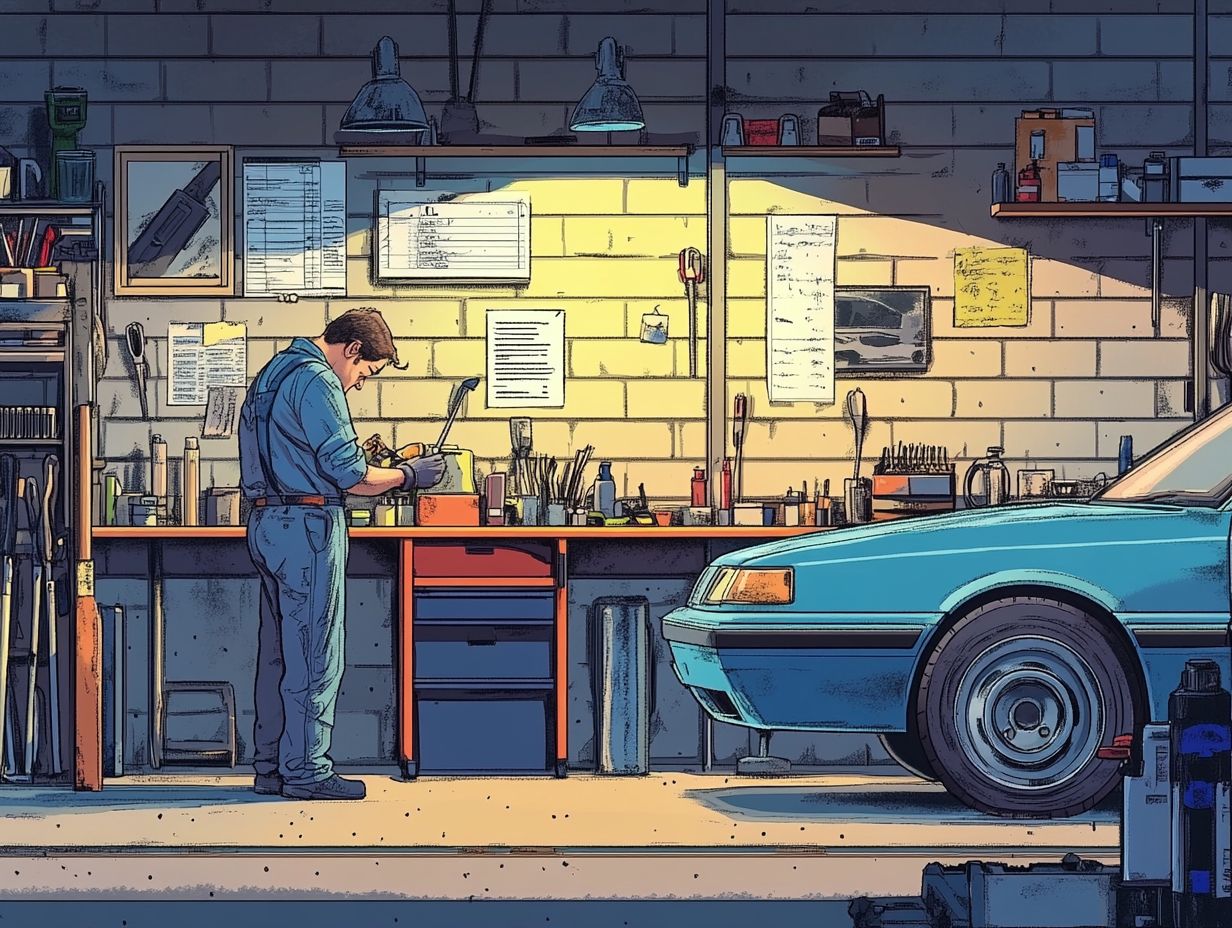
What are the 5 essential safety checks for used cars?
Discover the 5 essential safety checks for used cars, including checking the tires, inspecting the brakes, checking the fluids, examining the lights, and looking for any signs of damage. For a comprehensive guide, learn what to check before buying a used car.
Why are these safety checks important?
These checks are crucial because they ensure the car is safe to drive. Additionally, knowing about features to avoid in used cars can help prevent accidents and breakdowns.
How do I check the tires?
To check your tires, inspect the rubber for any irregularities. Look for signs of wear and ensure they are properly inflated. Remember, well-maintained tires are vital for your safety!
What should I look for when inspecting the brakes?
When inspecting your brakes, check for any signs of wear. Ensure the brake pads aren t too thin, and verify that the brake fluid level is adequate. Safe brakes are essential for stopping safely!
What fluids should I check?
You should check the engine oil, transmission fluid, brake fluid, and coolant levels. Make sure they are at the recommended levels and not leaking. Think of it like checking the fuel in your tank; it s vital for performance!
Do I need a professional to perform these safety checks?
While having a professional mechanic inspect a used car before purchasing is recommended, you can also perform these checks yourself by following 5 essential tips for common car maintenance. All you need is some basic knowledge and a few tools.
Take action now! Make sure to perform these safety checks before hitting the road in your used car, following 5 essential steps to buying a used car for the best driving experience and safety.




